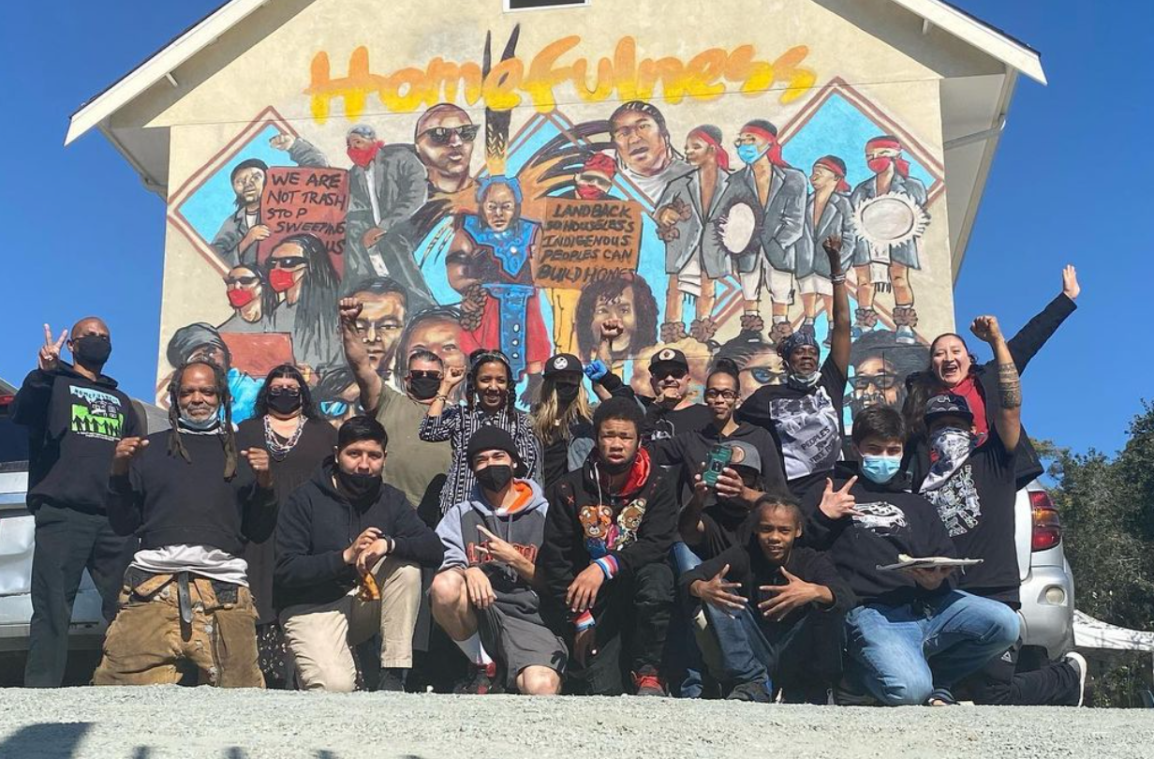Your cart is currently empty!
When housed, homeowning, and ruling-class settlers discuss the unhoused people in gentrifying areas, they frame unhoused people as a “problem.” Homefulness and POOR Magazine/Prensa Pobre, the poor and Indigenous people-led movement based in the unceded Huchuin-Ohlone land of Oakland, California, respond by centering unhoused, poor, and colonized peoples as artists, scholars, visionaries, and leaders. Recently, the group purchased a 10,000-square-foot lot to provide rent-free permanent housing for other unhoused people in East Oakland, expanding on an existing project currently providing housing for 11 individuals.
POOR Magazine pushes people with race and class privilege to substantially support this work not as a charity but as reparations. Not as a gift but as a duty. The ARD had the privilege of speaking with lisa “tiny” gray-garcía (@PovertySkola), a “poverty skola, a houseless mama, a houseless daughter, [and] all those people you don’t wanna see.” gray-garcía is a poet, filmmaker, visionary, author, and co-founder of this movement. The interview has been condensed for clarity and length.
TAKE ACTION
• Radically redistribute your wealth to support Homefulness as they raise $200,000 to construct housing.
• Apply to virtually attend POOR Magazine’s next PeopleSkool seminar on the last weekend in January 2023.
• Support other poor people-led movements like the Movimento Sem Terra, Abahlali baseMjondolo, and the Zapatistas.
How did you begin doing this work?
Literally because of my life. I’m the daughter of an Afro-Boricua woman, a mixed-race orphan who barely made it out of foster homes. When I was 11, I had to drop out of sixth grade and start working in a micro-business, which a lot of poor families do across Turtle Island and the world. In the United Snakes, if you’re seen as a poor family, you’re automatically targeted for criminalization. We had to start hiding because we ended up on the streets. So if I wasn’t going to be separated from my mom, we pretty much had to go underground. We bounced around outside, in and out of the shelter, and in our car when we were lucky enough to have one, up to the time I was 22, and we joined with other poor folks to create POOR Magazine.
What does POOR Magazine do?
It’s always rooted in media, art, and education. We call ourselves a movement in alignment with other poor people-led movements across Mama Earth: Abahlali baseMjondolo in South Africa, the Zapatistas in Chiapas, and the Movimento Sem Terra. We’re reframing the ways poor people are talked about without us. “Solutions” and poverty industries are built on our backs to manage and “deal with” and case mangle, as I say, poverty, instead of what we teach, which is radically redistributing. We work together with other poor and houseless leaders to build and organize other poor and houseless leaders. We’re organizing for workers’ rights and housing rights. We do art, theater, media, Po’ People’s Radio, the garden. We do PeopleSkool, where we, as poverty skolas, create a curriculum and teach folks with race and class privilege about radical redistribution.
What is radical redistribution?
We very clearly make the distinction between radical redistributing and “donating,” because donating comes from a savior mentality of charity. Charity is created out of a notion of saviorism. It puts the decision-making power of how much to give on the person giving. The charity-industrial complex means control of money that wasn’t yours: we all know it was extracted from Mama Earth, First Peoples, and from Black, Brown, and working-class bodies. And yet you, the hoarder, get to decide what to do with it, and we continue to be a class-stratified society. How do poor people get control of their own solutions?
How is Homefulness, the rent-free community in Oakland, a poor people-led solution?
One of our goals for Homefulness has always been to de-gentrify these poor and Black and Brown and working-class neighborhoods. Homefulness is about figuring out what the hood wants, what the people want. We began a process a year ago where we sat down with the whole neighborhood. What does the neighborhood want here? What do the youth want here? What do the elders want here?
None of this would have happened without permission and spiritual guidance from First Nations people. We travel with Ohlone-Lisjan elders because we understand this is not our land. We move humbly on to Mama Earth as we try to liberate, and we ask permission of the people of this land who were the original victims of removal and genocide. We root this in a Land Back narrative as well as with landless people’s movements throughout Mama Earth.
KEY TAKEAWAYS
• Unhoused, landless, and poor people are criminalized and framed as a “problem.”
• The charity model allows donors to retain power over how “their” money is given or not.
• Radical redistribution centers poor people instead of wealthy donors.
